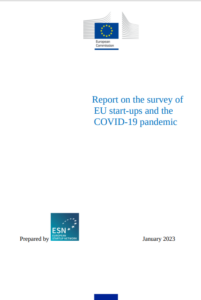The report describes the results of the work performed by the European Startup Network (ESN) in the framework of the contract GRO/SME/22/13030, awarded by the European Commission (EC) for a survey to gather information about how the situation of start-ups has been evolving following the COVID-19 pandemic. The survey was financed by the Single Market Programme (SMP) of the EU.
The report provides a varied picture in terms of the impact that the COVID-19 pandemic had on EU start-ups, the level and nature of public support they received, and their satisfaction with the support measured put in place by local authorities.
The main conclusions of the survey are:
- The two most prominent obstacles faced during the COVID-19 pandemic by the start- ups were “Access to finance” and “Regulatory obstacles or administrative burden”, chosen by 68% and 52% of respondents;
- A slight majority of respondents (54%) reported that their business experienced a negative development during the COVID-19 pandemic;
- The two most prominent kinds of support received by the start-ups during the COVID- 19 pandemic were “Additional credit lines” (50%) and “Salary subsidies for employees” (40%);
- 48% of respondents claimed to be either satisfied or very satisfied with the COVID- 19 support received, while 25% were either disappointed or very disappointed;
- The majority of respondents (66%) reported the overall strength and performance of their regional business environment to be either “Fairly good” (50%) or “Very good” (16%).
The lessons learnt can be applied to future crises, such as the ongoing Russian war of aggression against Ukraine.
The report recommends that the EU provide tailored support to European start-ups, taking into account their specific needs and characteristics, which may differ from those of traditional small and medium-sized enterprises (SMEs).
This support should prioritise automatic allocation, as start-ups often have limited resources and time to devote to bureaucratic procedures. Additionally, it may not be appropriate to base the allocation of support on recent economic performance, as start-ups tend to have a fast-growing nature and dynamic evolution of their financial parameters.
© European Commission – Financed through the Single Market Programme.
Rea the report:


